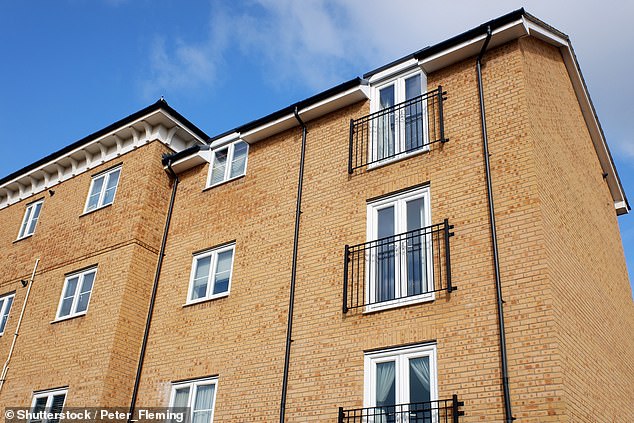I’m keen to buy my first home, but can only afford a flat in the areas I’m focusing on. I’d love a little house with a garden, but it’s just not going to happen with my budget.
I’ve noticed some flats are described as leasehold, but others are ‘share of freehold’. What exactly does it mean?
What will I be getting and what are the pros, cons and possible costs involved?
Is it also better to buy a flat with a share of the freehold over a leasehold flat?

Flat matters: A Daily Mail reader wants to know what it means to buy a share of the freehold
Jane Denton, of the Daily Mail, replies: I’ll start by describing what it means to buy a leasehold, which is the more common form of ownership for flats, and then explain how share of freehold is different.
If you buy a leasehold flat, you would own the lease of the property, which typically lasts decades or even centuries. It is is best to have a longer lease, as short leases can reduce the property’s value.
With a leasehold flat, you would have to pay an annual ground rent to the property’s freeholder. This could be the developer that built the flats, another company, or an individual.
There’s also usually an annual service charge to pay, and this can vary hugely depending on the block you live in and what grounds or amenities the block has.
Service charges can rise significantly, so always check the terms of the lease carefully with a solicitor before taking the plunge. Be aware that leaseholders do not have a say in how the building is managed.
How the leasehold system works is changing. The Leasehold and Freehold Reform Act 2024 is now law, but is far from being fully implemented.
Owning a share of the freehold, however, means you would own a portion of the building’s freehold along with the leasehold for your individual flat. Freeholders own the building, the land it stands on and the airspace around it.
In a block of flats, the freehold of the building as a whole is owned collectively by the people who own the individual flats. A freehold can be owned and organised in one of two ways, either via joint management or through a management company.
In theory, those with a share of the freehold have more control over their properties than standard leaseholders do, as well as the ability to make decisions about how it is managed and maintained.
You and other flat owners would decide together how the property is managed, maintained and altered. This means that decisions regarding service charges, ground rent and other fees may be decided by the collective group of freeholders.
If you purchased a flat with a share of the freehold, you would need to be happy to have these shared responsibilities and costs.
While owning a share of the freehold has certain benefits, it is not always a straightforward option. Disagreements between flat owners with a share of the freehold are not uncommon, particularly when it comes to agreeing who is paying for what and how much.
Unless a management firm has control, responsibilities as a flat owner with a share of the freehold can be time-consuming and stressful.
Homeowners with a share of the freehold do not usually have to pay ground rent, but if they do, it is generally low. Service charges may still apply.
Even if you buy a flat with a share of the freehold, remember that the lease still regulates the ownership of the flat. Before buying, you would need to get a copy of it and ensure you understand it.
I asked two experts for their thoughts on your question.

Stephen Perkins is managing director of Yellow Brick Mortgages
Stephen Perkins, managing director of Yellow Brick Mortgages, says: Buying your first home often means compromise, but understanding the difference between leasehold and share of freehold could save you money and give you more control in the long run.
Before settling for a flat over your dream of a house with a garden, it’s worth seeking professional mortgage advice to fully explore your options. Some buyers assume their budget only allows for a flat, but there may be alternatives.
For example, a joint borrower, sole proprietor mortgage, which is similar to a guarantor mortgage, could allow a family member’s income to boost your borrowing power.
Government schemes such as shared ownership may also help, where you purchase part of a property, often 25 to 50 per cent, and pay rent on the remainder.
When it comes to flats, the vast majority are sold as leasehold. This is because the building and land are owned by a freeholder, who grants leases for the individual flats.
Leaseholders pay service charges to cover upkeep of communal areas, buildings insurance, and sometimes ground rent. These costs and responsibilities are set out in the lease and managed by the freeholder or a management company.
If a flat is sold with a share of the freehold, it means that, as well as owning the lease, you also own part of the freehold title, either directly, or through a company formed by the leaseholders.
This arrangement gives you and the other freeholders joint responsibility for maintaining the building.
The benefits are significant: no ground rent, more control over service charges, and the ability to extend the lease more easily and at a lower cost.
Properties with short leases can be harder to sell or mortgage, so having a share of the freehold is reassuring for the future.
However, with greater control comes greater responsibility. Freeholders must agree on maintenance decisions, organise repairs, and ensure the building is insured. Disagreements between co-owners can slow things down, especially in larger blocks.
From a mortgage perspective, lenders are usually comfortable with share of freehold properties, as lending is still secured against the leasehold title.
The conveyancing process can take slightly longer and cost more, as the freehold ownership needs to be transferred alongside the lease.
Ultimately, whether a share of freehold is better comes down to personal preference.
Many buyers value the control and long-term savings, but it also depends on the number of co-owners, the quality of management, and how well everyone works together.
Before committing, it’s sensible to review the lease, accounts, and management arrangements carefully with your solicitor.
Martin Edwards, a senior associate at HCB Widdows Mason, says: Buying a flat with a share of the freehold is an appealing proposition for many, but it’s a complex arrangement that demands careful consideration.
At its core, you’re not just buying a home; you’re also becoming a part-owner of the building and the land it sits on, alongside your neighbours.
You’ll hold a long lease for your flat while collectively owning the freehold

Martin Edwards is a senior associate at HCB Widdows Mason
This model offers significant benefits that go beyond the typical leasehold arrangement.
One of the most attractive aspects is the greater control you gain over the property’s management.
You and your fellow freeholders can decide on maintenance, repairs, and other key decisions without the need for an external management company.
This often translates to avoiding the ground rent that’s a common feature of standard leases.
What’s more, your lease is typically a long one, and you and the other owners can collectively agree to extend it or make alterations to your flat, simplifying a process that can be cumbersome with a third-party landlord.
However, this increased control comes with its own set of challenges. The arrangement is essentially a joint venture, and you’ll need to manage the property collectively.
This can lead to potential disputes with your fellow freeholders, especially regarding management decisions and finances.
There’s a shared financial responsibility for maintenance and repairs, and you’re reliant on everyone being able to pay their share, which isn’t always a given.
Essentially, you’re tying your finances and property management to a group of people, and getting everyone to agree on key issues can be a significant hurdle.
In my view, while the benefits are considerable, the potential for shared responsibility and conflict makes it crucial to understand exactly what you’re getting into.
It’s often a more complicated transaction than a standard leasehold, requiring a robust legal framework to govern the relationship between the owners. It’s a fantastic option for those who want more autonomy over their property, but it’s not without its risks.












